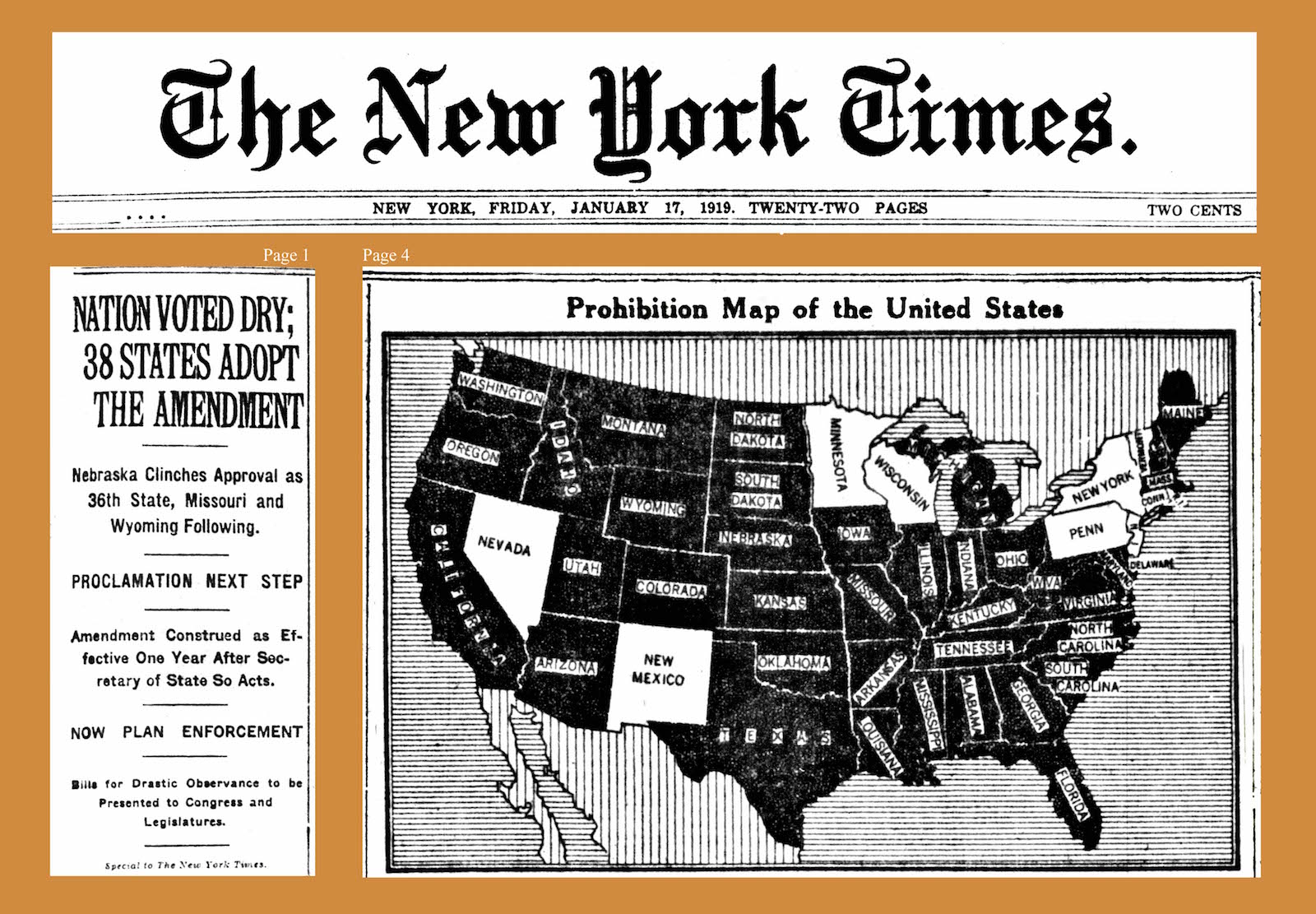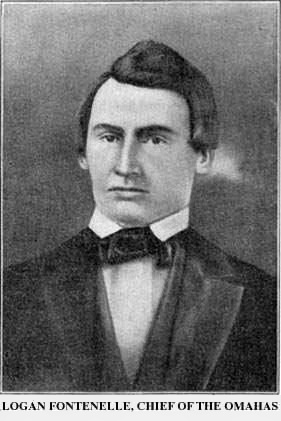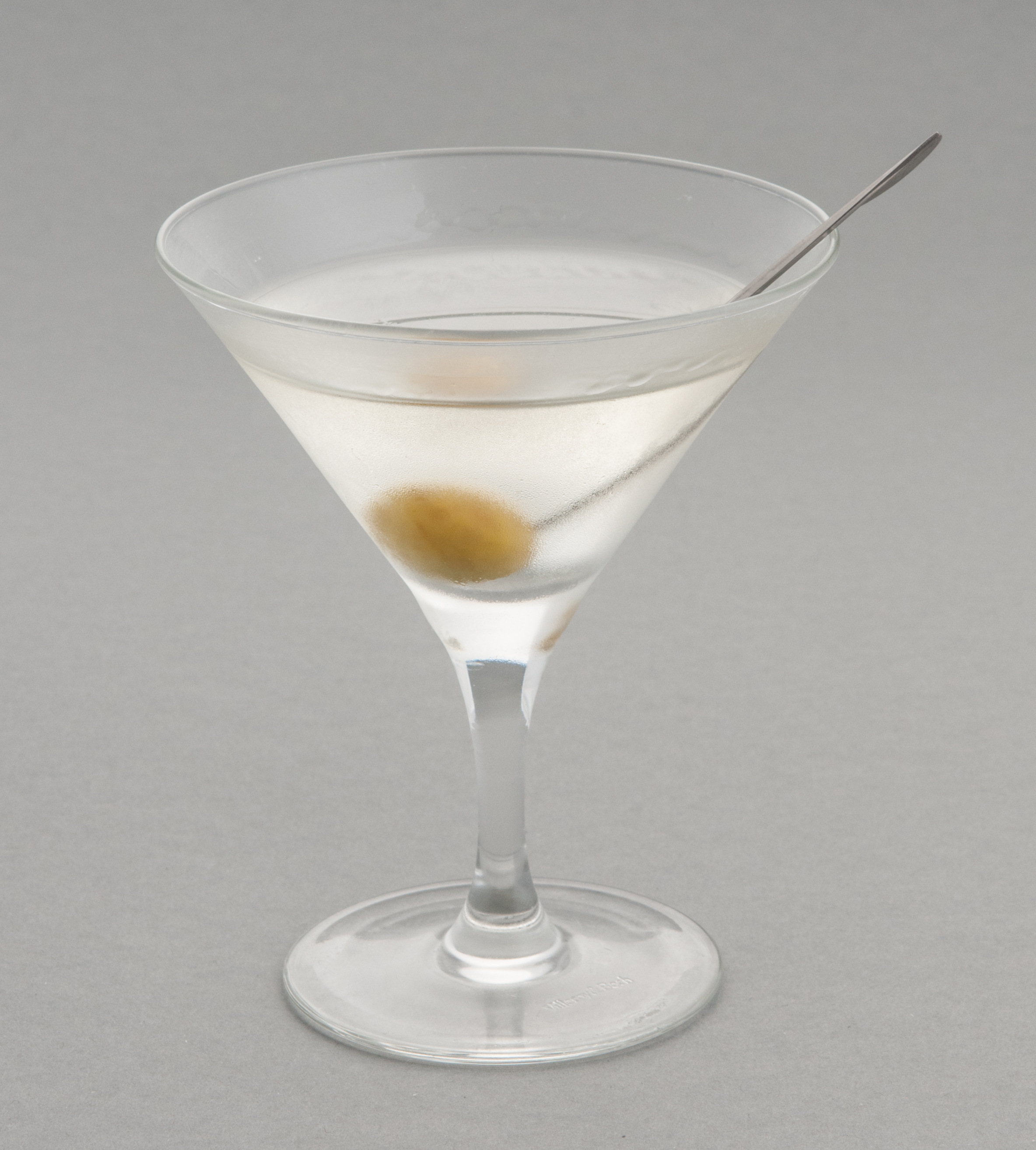|
National Prohibition Act
The National Prohibition Act, known informally as the Volstead Act, was an act of the 66th United States Congress designed to execute the 18th Amendment (ratified January 1919) which established the prohibition of alcoholic drinks. The Anti-Saloon League's Wayne Wheeler conceived and drafted the bill, which was named after Andrew Volstead, chairman of the House Judiciary Committee, who managed the legislation. Historical context The Volstead Act had a number of contributing factors that led to its ratification in 1919. For example, the formation of the Anti-Saloon League in 1893. The league used the after effects of World War I to push for national prohibition because there was a lot of prejudice and suspicion of foreigners following the war. Many reformers used the war to get measures passed and a major example of this was national prohibition. The league was successful in getting many states to ban alcohol prior to 1917 by claiming that to drink was to be pro-German and ... [...More Info...] [...Related Items...] OR: [Wikipedia] [Google] [Baidu] |
Andrew Volstead
Andrew John Volstead () (October 31, 1859 – January 20, 1947) was an American member of the United States House of Representatives from Minnesota, 1903–1923, and a member of the Republican Party. His name is closely associated with the National Prohibition Act of 1919, usually called the Volstead Act. The act was the enabling legislation for the enforcement of Prohibition in the United States beginning in 1920. Early life Volstead was born in Kenyon, Goodhue County, Minnesota, to Norwegian-American parents Jon Einertson Vraalstad (John Vrolstad), a distant relative of Queen Sonja of Norway, and wife Dorothea Mathea Lillo. He was educated at St. Olaf College, became a lawyer and served as mayor of Granite Falls, Minnesota, from 1900 to 1902. According to his obituary in a 1947 edition of the ''Minneapolis Star'', he first practiced law in Grantsburg, Wisconsin, before moving to Granite Falls in 1886. Congressional career While in Congress, he served as chairman of ... [...More Info...] [...Related Items...] OR: [Wikipedia] [Google] [Baidu] |
Omaha
Omaha ( ) is the List of cities in Nebraska, most populous city in the U.S. state of Nebraska. It is located in the Midwestern United States along the Missouri River, about north of the mouth of the Platte River. The nation's List of United States cities by population, 41st-most-populous city, Omaha had a population of 486,051 at the 2020 United States census, 2020 census. The eight-county Omaha–Council Bluffs metropolitan area, which extends into Iowa, has approximately 1 million residents and is the Metropolitan statistical area#United States, 55th-largest metro area in the United States. Omaha is the county seat of Douglas County, Nebraska, Douglas County. Omaha's pioneer period began in 1854, when the city was founded by speculators from neighboring Council Bluffs, Iowa. The city was founded along the Missouri River, and a crossing called Lone Tree Ferry earned the city its nickname, the "Gateway to the West". Omaha introduced this new West to the world in 1898, when it ... [...More Info...] [...Related Items...] OR: [Wikipedia] [Google] [Baidu] |
Iowa
Iowa ( ) is a U.S. state, state in the upper Midwestern United States, Midwestern region of the United States. It borders the Mississippi River to the east and the Missouri River and Big Sioux River to the west; Wisconsin to the northeast, Illinois to the east and southeast, Missouri to the south, Nebraska to the west, South Dakota to the northwest, and Minnesota to the north. Iowa is the List of U.S. states and territories by area, 26th largest in total area and the List of U.S. states and territories by population, 31st most populous of the List of states and territories of the United States, 50 U.S. states, with a population of 3.19 million. The state's List of capitals in the United States, capital, List of cities in Iowa, most populous city, and largest List of metropolitan statistical areas, metropolitan area fully located within the state is Des Moines, Iowa, Des Moines. A portion of the larger Omaha–Council Bluffs metropolitan area, Omaha, Nebraska, metropolitan area ... [...More Info...] [...Related Items...] OR: [Wikipedia] [Google] [Baidu] |
Illinois
Illinois ( ) is a U.S. state, state in the Midwestern United States, Midwestern United States. It borders on Lake Michigan to its northeast, the Mississippi River to its west, and the Wabash River, Wabash and Ohio River, Ohio rivers to its south. Of the fifty U.S. states, Illinois has the List of U.S. states and territories by GDP, fifth-largest gross domestic product (GDP), the List of U.S. states and territories by population, sixth-largest population, and the List of U.S. states and territories by area, 25th-most land area. Its capital city is Springfield, Illinois, Springfield in the center of the state, and the state's largest city is Chicago in the northeast. Present-day Illinois was inhabited by Indigenous peoples of the Americas#History, Indigenous cultures for thousands of years. The French were the first Europeans to arrive, settling near the Mississippi and Illinois River, Illinois rivers in the 17th century Illinois Country, as part of their sprawling colony of ... [...More Info...] [...Related Items...] OR: [Wikipedia] [Google] [Baidu] |
Michigan State Police
The Michigan State Police (MSP) is the State police (United States), state police agency for the U.S. state of Michigan. The MSP is a full-service law enforcement agency, with its sworn members having full police powers statewide. The department was founded in 1917 as a wartime constabulary (originally named the Michigan State Troops Permanent Force) and eventually evolved into the modern agency that it is today. The department's entry-level members are called "Recruits", who eventually earn the title of "Trooper". Its headquarters is in Dimondale, Michigan. History The Michigan Department of State Police began as a temporary, wartime emergency force for the purpose of domestic security during World War I. On April 19, 1917, Governor Albert Sleeper created the Michigan State Troops Permanent Force, also known as the Michigan State Constabulary. With Colonel Roy C. Vandercook as the first commanding officer, this new force consisted of five Troops of mounted, dismounted and motori ... [...More Info...] [...Related Items...] OR: [Wikipedia] [Google] [Baidu] |
Detroit
Detroit ( , ) is the List of municipalities in Michigan, most populous city in the U.S. state of Michigan. It is situated on the bank of the Detroit River across from Windsor, Ontario. It had a population of 639,111 at the 2020 United States census, 2020 census, making it the List of United States cities by population, 26th-most populous city in the United States and the largest U.S. city on the Canada–United States border. The Metro Detroit area, home to 4.3 million people, is the second-largest in the Midwestern United States, Midwest after the Chicago metropolitan area and the 14th-largest in the United States. The county seat, seat of Wayne County, Michigan, Wayne County, Detroit is a significant cultural center known for its contributions to music, art, architecture and design, in addition to its historical automotive and industrial background. In 1701, Kingdom of France, Royal French explorers Antoine de la Mothe Cadillac and Alphonse de Tonty founded Fort Pontc ... [...More Info...] [...Related Items...] OR: [Wikipedia] [Google] [Baidu] |
Socio-economic Group
A social class or social stratum is a grouping of people into a set of hierarchical social categories, the most common being the working class and the capitalist class. Membership of a social class can for example be dependent on education, wealth, occupation, income, and belonging to a particular subculture or social network. Class is a subject of analysis for sociologists, political scientists, anthropologists and social historians. The term has a wide range of sometimes conflicting meanings, and there is no broad consensus on a definition of class. Some people argue that due to social mobility, class boundaries do not exist. In common parlance, the term social class is usually synonymous with socioeconomic class, defined as "people having the same social, economic, cultural, political or educational status", e.g. the working class, "an emerging professional class" etc. However, academics distinguish social class from socioeconomic status, using the former to refer to one's re ... [...More Info...] [...Related Items...] OR: [Wikipedia] [Google] [Baidu] |
Cocktail Party
A cocktail party is a party at which cocktails are served. It is sometimes called a cocktail reception. A cocktail party organized for purposes of social or business networking is called a mixer. Some events, such as wedding receptions, are preceded by a cocktail hour. During the cocktail hour, guests socialize while drinking and eating appetizers. Organizers of these events use the cocktail hour to occupy guests between related events and to reduce the number of guests who arrive late. Although it has been said that the inventor of the cocktail party was Alec Waugh of London, an article in the '' St. Paul Pioneer Press'' in May 1917 credited its invention to Mrs. Julius S. Walsh Jr. of St. Louis, Missouri. Mrs. Walsh invited 50 guests to her house on a Sunday at high noon for a one-hour affair. "The party scored an instant hit," the newspaper declared, stating that within weeks cocktail parties had become "a St. Louis institution". Alec Waugh noted that the first cocktail ... [...More Info...] [...Related Items...] OR: [Wikipedia] [Google] [Baidu] |
Cocktail
A cocktail is a mixed drink, usually alcoholic beverage, alcoholic. Most commonly, a cocktail is a combination of one or more liquor, spirits mixed with other ingredients, such as juices, flavored syrups, tonic water, Shrub (drink), shrubs, and bitters. Cocktails vary widely across regions of the world, and many websites publish both original recipes and their own interpretations of older and more famous cocktails. History A well-known 'cocktail' in ancient Greece was named kykeon. It is mentioned in the Homeric texts and was used in the Eleusinian Mysteries. 'Cocktail' accessories are exposed in the Museum of the Royal Tombs of Aigai (Vergina), Museum of the Royal Tombs of Aigai (Greece). They were used in the court of Philip II of Macedon to prepare and serve mixtures of wine, water, honey as well as extracts of aromatic herbs and flowers, during the banquets. In the United States, a written mention of 'cocktail' as a beverage appeared in ''The Farmers Cabinet,'' 1803. T ... [...More Info...] [...Related Items...] OR: [Wikipedia] [Google] [Baidu] |
Speakeasy
A speakeasy, also called a beer flat or blind pig or blind tiger, was an illicit establishment that sold alcoholic beverages. The term may also refer to a retro style bar that replicates aspects of historical speakeasies. In the United States, speakeasy bars date back to at least the 1880s, but came into prominence in the United States during the Prohibition era (1920–1933, longer in some states). During that time, the sale, manufacture, and transportation ( bootlegging) of alcoholic beverages was illegal throughout the United States, due to the Eighteenth Amendment to the United States Constitution. Speakeasies largely disappeared after Prohibition ended in 1933. The speakeasy-style trend began in 2000 with the opening of the bar Milk & Honey. Etymology The phrase "speak softly shop", meaning a "smuggler's house", appeared in a British slang dictionary published in 1823. The similar phrase "speak easy shop", denoting a place where unlicensed liquor sales were made, ... [...More Info...] [...Related Items...] OR: [Wikipedia] [Google] [Baidu] |
Smuggling
Smuggling is the illegal transportation of objects, substances, information or people, such as out of a house or buildings, into a prison, or across an international border, in violation of applicable laws or other regulations. More broadly, social scientists define smuggling as the purposeful movement across a border in contravention to the relevant legal frameworks. There are various motivations to smuggle. These include the participation in illegal trade, such as in the drug trade, illegal weapons trade, prostitution, human trafficking, kidnapping, heists, chop shops, illegal immigration or illegal emigration, tax evasion, import restrictions, export restrictions, providing contraband to prison inmates, or the theft of the items being smuggled. Smuggling is a common theme in literature, from Bizet's opera ''Carmen'' to the James Bond spy books (and later films) '' Diamonds Are Forever'' and '' Goldfinger''. Etymology The verb ''smuggle'', from Low German ''smuggeln'' o ... [...More Info...] [...Related Items...] OR: [Wikipedia] [Google] [Baidu] |





